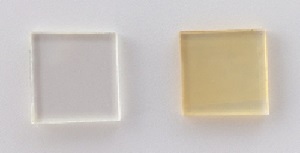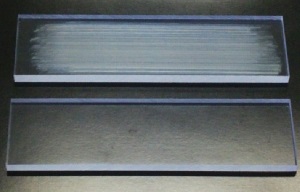DNP to Launch Weather and Wear Resistant Resin Glass for Automobiles
Dai Nippon Printing Co., Ltd. (DNP) has developed a hard coat transfer filmthat improves weather and wear resistance by transferring to resin glass1, andwill launch sales of the resin glass in February 2016.
The resin glass is equipped with advanced weather and wear resistant features,and also makes it possible to reduce ultraviolet (UV) derived deterioration.The newly developed hard coat transfer film has been adopted for use with resinglass in automobile windows.
[Background]
DNP has positioned Lifestyle and Mobility as one of business growth areas.Along with residences, work places, schools and commercial facilities, the Companyis also endeavoring to ensure comfort in moving spaces, such as automobilesand trains. And at the same time, we are also looking to create informationservices that can be accessed anywhere, anytime. In the automobile area, theCompany currently offers decorative film for interior purposes and a viewingangle control film targeting in-vehicle displays. In addition to these efforts,DNP has also moved to strengthen its business base. In August, 2015, TamuraPlastic MFG Co., Ltd., which maintains a substantial domestic share in sidevisors attached to the upper portion of automobile windows, became part of theDNP Group.
Apart from maintaining superior anti-shock and thermal insulation properties,the weight of the resin glass is approximately half that compared to existingglass, and we are seeing increased needs for use as window glass in train carriages,construction equipment and automobiles.
While polycarbonate resin glass has superior processing features, it presentsthe challenge of being inferior to standard glass in the areas of weather resistanceto sunlight and the elements, in hardness and also anti-scratching features.In answer to these challenges, DNP has leveraged unique Electron Beam (EB) technology2developed through the manufacture of materials for housing, and has successfullydeveloped a film that improves weather and wear resistance by transferring thisto the surface of resin glass. The Company will market the resin glass to whichthis film has been transferred.
[Features of Newly Developed Resin Glass]
- It has been made possible to configure a hard coat layerwhich has high hardness by using EB technology, which compared with polycarbonateresin used in generic products, is more difficult to scratch due to improvementsin surface wear resistance. At the same time, it has also been made possibleto improve weather resistance, including UV-derived discoloration and deterioration.
- By molding the resin glass at the same time as transferringthe film, it has been possible to reduce processing costs.
- As the newly developed product is plastic, the weightis approximately half that of glass, while maintaining a similar transparencyto glass.
- The newly developed product exhibits superior anti-shockfeatures, and as there is little possibility of shattering, means that it alsomaintains superior safety features.
Weather resistance testing - comparison

DNP product (at left) remains transparent, while the generic product (atright) is discolored.
* Weather resistance testing : xenon arc lamp 1,300MJ/m2(2,000hours) (JISK 7350-2 : 2008 compatible)
Wear resistance testing (steel wool) - comparison

DNP product (below) shows no scratching, while the generic product (above)is scratched.
* Wear resistance testing: steel wool with a load of 1kg, 1,000 reciprocations(DNP measurement)
[Forward Looking Events]
DNP will market the newly developed resin glass for use in railway carriages,construction equipment, automobiles and busses, aiming for total sales of 1.0billion yen by FY 2017.
1: Resin glass: Not a general glass based on silicic acid, but an organicglass based on plastics such as polycarbonate.
2: EB technology: A coating technology used in the hardening of irradiatedresin. Compared to products coated with urethane or UV resin, EB technologymakes such products more resilient against scratching, fouling and sunlight,and makes it possible to ensure advanced resilience and practical performance,and stable quality properties. EB technology is a next-generation eco-friendlytechnology that facilitates energy savings in the manufacturing process, reducedCO2 emissions and solvent free coating.
* Product prices, specification and service contents mentioned in this newsrelease are current as of the date of publication. They may be changed at anytime without notice.